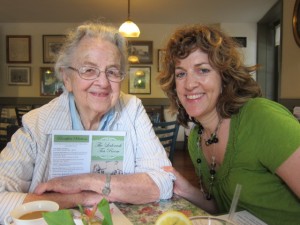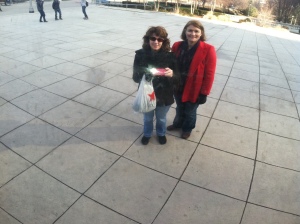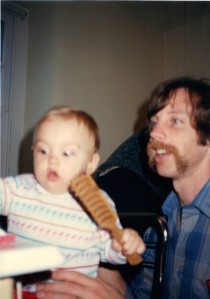Written Spring of 2012
When I was born, Souderton Mennonite Church met at Christopher Dock Mennonite High School for our Sunday morning services because our church building was being renovated. My mom recalls that because there was no nursery, she would have to go out in the car to quiet and feed me when I cried during the service.
As a young girl, I went fishing on the pond at Dock along with my dad and my brother. I was too young, and perhaps the wrong gender, to have a fishing rod, but I found a stick and attached some fishing line to drop over the pond’s edge and catch a 7-inch bass. My dad was shocked, especially since he and Steve hadn’t had any success. From then on my dad let me use a fishing rod.
I learned to love the arts at Dock. Some of my earliest memories are of coming and going to CD music and drama programs. When my sister Linda was in the junior play To Kill a Mockingbird as Mrs. Merriweather, I was eight years old and the television set was not yet prominent in our home. I sat enthralled at the Dock performances; so much so, that my “movie stars” became the junior play’s main characters, such as, Jane Wenger as Scout and Yvonne Meyers as Christy. Being entertained at the CD programs was a highlight for me as a young girl and I lived for the next event.
It also didn’t feel like Christmas if our family didn’t make the short drive to Christopher Dock to hear their seasonal choir and instrumental programs. We left early to attend these programs to “get a good seat” but often ended up in the balcony because it was a Mennonite hot spot. At a young age, I learned to appreciate four part harmony from masterfully trained choirs. At Christmas time it was always a special treat to hear Eleanor Ruth and the CD faculty quartet sing “The Star.”
When I began attending Dock in 1975, I was drawn to the drama and music that was offered. I remember Ms. Beth Ranck selecting me to portray Helen Keller in the Miracle Worker and instructing me to spend a day at school blindfolded so I could experience what it felt like to be blind. Being a part of dramas was like a childhood dream come true and I thoroughly enjoyed the camaraderie involved with a large group of people working and performing together. Through Mr. Gerald Benner, Steinbeck’s Grapes of Wrath came alive and with the assistance of Ms. Lois Driver, I entered my first writing contest and I began to see the power and catharsis of the written word. It was through these teachers’ encouragement that I majored in English after graduating from Dock in 1979.
When I finished college, I naturally wanted to return to the nurturing place of my youth and relive the joys of being part of the CD community. Unfortunately, teaching at Dock was much more difficult than any of my previous experiences. But with the passing of years, the faces of the student body, faculty and administration continue to change and it’s hard to stay bitter about a place that has nurtured me all my life.
In 2003, our oldest child began attending at Dock and when our daughter graduates in 2014, it will be eleven years of watching our children grow spiritually, watching them challenged by social and service opportunities, and watching them develop emotional maturity at Dock. They reflect the traditions and values of their Mennonite heritage and the Mennonite community that raised them.
I realize that for me and perhaps for many Mennonites in the Franconia Conference, we rallied around our high school that was founded in the 1950s and named after a local schoolmaster, but more importantly, our lives were forever changed and continue to be intertwined with Christopher Dock Mennonite High School. — BBM
Also published in part at http://www.dockhs.org/files/Publications/Lamplighter/Summer%202012/Lamplighter_Summer_12_web.pdf
![IMG_1747[1]](https://mymennonitememoir.files.wordpress.com/2012/06/img_17471.jpg?w=225&h=300)


![images[2]](https://mymennonitememoir.files.wordpress.com/2012/06/images21.jpg?w=676)

![images[2]](https://mymennonitememoir.files.wordpress.com/2012/06/images2.jpg?w=676)


